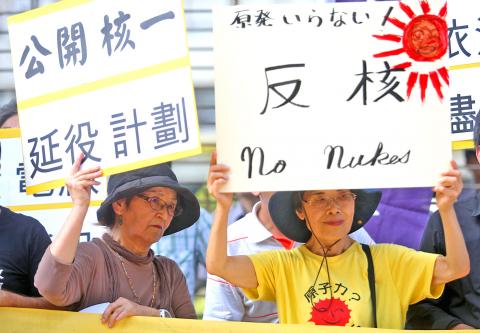Panelists at this year’s No Nukes Asia Forum (NNAF) in Taipei yesterday highlighted the risks posed by nuclear energy and its rapid expansion despite the Fukushima Dai-ichi nuclear power plant disaster three years ago.
NNAF Japan coordinator Daisuke Saito told the forum that three years after the meltdown in Japan, about 140,000 displaced residents still live in shelters.
Despite spending ¥10 trillion (US$91.7 billion) to remove a 10cm-thick layer of soil contaminated by nuclear radiation, the Japanese government has yet to succeed in purging the land, he added.

Photo: CNA
The hope to abolish nuclear energy is a universal one, Saito said, citing as an example Japan’s Kagoshima Prefecture, where discussions on the reactivation of Sendai Power Plant are taking place, prompting about 16,000 Tokyo residents to take to the streets last week to protest the plan.
An additional 8,000 Kagoshima residents rallied in their hometown — a remarkable display of public opinion in the rural prefecture, he said.
Saito also apologized in his capacity as a Japanese national on behalf of Japanese companies Hitachi Ltd and Toshiba Corp for exporting nuclear reactor modules to Taiwan that were used in the construction of the Fourth Nuclear Power Plant in New Taipei City’s Gongliao District (貢寮).
Mari Takenouchi, a Japanese reporter from Okinawa Prefecture, accused the UN Scientific Committee on the Effects of Atomic Radiation of publishing false studies that claim nuclear radiation is “harmless” to the human body.
Calling the committee’s move “criminal,” she said that the UN might appear to show concern over threats posed by nuclear power, but it is lobbying for development of the high-risk energy.
She said the chance of contracting thyroid cancer in Fukushima used to be one in 1 million, but after the nuclear accident, the figure rose to one in 3,000.
Takenouchi said the nuclear radiation emitted in the aftermath of the accident not only affected Fukushima residents, but spread across a vast area.
“My family and I were in Tokyo on March 15, 2011, when a nuclear cloud [generated from the Fukushima nuclear meltdown] passed over the city. During the several weeks that followed, my son developed fever 12 or 13 times, lost weight and had rashes all over,” she said.
Since the accident, many Fukushima residents reported symptoms including vomiting, abnormal nosebleed and loss of body hair, Takenouchi added.
Daniel Tam (譚棨禧), a member of the Hong Kong Alliance Against Nukes, warned of the rapid pace at which China is constructing nuclear plants in its coastal provinces, saying that it has least 20 operating plants and is planning to build 28 more.
“Countries all over the world have been more cautious with their nuclear energy policies after the Dai-ichi disaster. Yet, China is building nuclear plants at a speed unprecedented in human history,” he said.
“Hong Kong has been using nuclear energy for more than 20 years. Therefore, many Hong Kongers feel obligated to monitor the operation of power plants. I hope that the people of Taiwan and Hong Kong can have more interactions by disseminating information on this issue,” he said.

Taiwanese can file complaints with the Tourism Administration to report travel agencies if their activities caused termination of a person’s citizenship, Mainland Affairs Council Minister Chiu Chui-cheng (邱垂正) said yesterday, after a podcaster highlighted a case in which a person’s citizenship was canceled for receiving a single-use Chinese passport to enter Russia. The council is aware of incidents in which people who signed up through Chinese travel agencies for tours of Russia were told they could obtain Russian visas and fast-track border clearance, Chiu told reporters on the sidelines of an event in Taipei. However, the travel agencies actually applied

Japanese footwear brand Onitsuka Tiger today issued a public apology and said it has suspended an employee amid allegations that the staff member discriminated against a Vietnamese customer at its Taipei 101 store. Posting on the social media platform Threads yesterday, a user said that an employee at the store said that “those shoes are very expensive” when her friend, who is a migrant worker from Vietnam, asked for assistance. The employee then ignored her until she asked again, to which she replied: "We don't have a size 37." The post had amassed nearly 26,000 likes and 916 comments as of this

New measures aimed at making Taiwan more attractive to foreign professionals came into effect this month, the National Development Council said yesterday. Among the changes, international students at Taiwanese universities would be able to work in Taiwan without a work permit in the two years after they graduate, explainer materials provided by the council said. In addition, foreign nationals who graduated from one of the world’s top 200 universities within the past five years can also apply for a two-year open work permit. Previously, those graduates would have needed to apply for a work permit using point-based criteria or have a Taiwanese company

The Shilin District Prosecutors’ Office yesterday indicted two Taiwanese and issued a wanted notice for Pete Liu (劉作虎), founder of Shenzhen-based smartphone manufacturer OnePlus Technology Co (萬普拉斯科技), for allegedly contravening the Act Governing Relations Between the People of the Taiwan Area and the Mainland Area (臺灣地區與大陸地區人民關係條例) by poaching 70 engineers in Taiwan. Liu allegedly traveled to Taiwan at the end of 2014 and met with a Taiwanese man surnamed Lin (林) to discuss establishing a mobile software research and development (R&D) team in Taiwan, prosecutors said. Without approval from the government, Lin, following Liu’s instructions, recruited more than 70 software